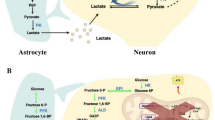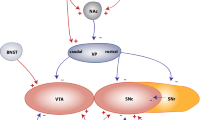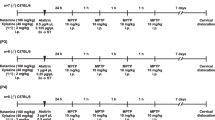Summary
Degeneration of nigrostriatal dopaminergic neurons is the primary histopathological feature of Parkinson's disease. The neurotoxin MPTP (1-methyl-4phenyl-1,2,3,6-tetrahydropyridine) induces a neurological syndrome in man and non-human primates very similar to idiopathic Parkinson's disease by selectively destroying dopaminergic nigrostriatal neurons. This gives rise to the hypothesis that Parkinson's disease may be caused by endogenous or environmental toxins. Endogenous excitatory amino acids (EAAs) such as l-glutamate could be involved in neurodegenerative disorders including Parkinson's disease. We report in this study that the competitive NMDA antagonist CPP (3-((±)-2-carboxypiperazin-4yl)-propyl-1-phosphonic acid) protects nigral tyrosine hydroxylase (TH) positive neurons from degeneration induced by systemic treatment with MPTP in common marmosets. This indicates that EAAs are involved in the pathophysiological cascade of MPTP-induced neuronal cell death and that EAA antagonists may offer a neuroprotective therapy for Parkinson's disease.
Similar content being viewed by others
Abbreviations
- AMPA:
-
α-amino-3-hydroxy-5-methyl-4-isoxazolepropionate
- CPP:
-
3-((±)-2-carboxypiperazin-4-yl)-propyl-1-phosphonic acid
- DOPAC:
-
dihydroxyphenylacetic acid
- EAA:
-
excitatory amino acid
- 5-HIAA:
-
5-hydroxyindolacetic acid
- 5-HT:
-
serotonin
- HVA:
-
homovanillic acid
- MAO-B:
-
monoamine oxidase type B
- MK-801:
-
dizocilpine
- MPP+ :
-
1-Methyl-4-phenylpyridinium ion
- MPTP:
-
1-Methyl-4-phenyl-1,2,3,6-tetrahydropyridine
- NA:
-
moradrenaline
- NMDA:
-
N-methyl-d-aspartate
- TH:
-
tyrosine hydroxylase
- QUIS:
-
quisqualate
References
Bormann J (1989) Memantine is a potent blocker of N-methyl-d-aspartat (NMDA) receptor channels. Eur J Pharmacol 166:591–592
Burns RS, Chiueh CC, Markey SP, Ebert MH, Jacobowitz DM, Kopin IJ (1983) A primate model of parkinsonism; selective destruction of dopaminergic neurons in the pars compacta of the substantia nigra by N-methyl-4-phenyl-1,2,3,6-tetrahydropyridine. Proc Natl Acad Sci USA 80:4546–4550
Carboni S, Melis F, Pani L, Hadliconstantinou M, Rossetti Z (1990) The non-competitive NMDA-receptor antagonist MK-801 prevents the massive release of glutamate and aspartate from rat striatum induced by 1-methyl-4-phenylpyridinium (MPP+). Neurosci Lett 117:129–133
Castagnoli A Jr, Chiba K, Trevor AJ (1985) Potential bioactivation pathways for the neurotoxin 1-methyl-4-phenyl-1,2,3,6-tetrahydropyridine (MPTP). Life Sci 36:225–230
D'Amato RJ, Alexander GM, Schwartzman RJ, Kitt AC, Price DL, Snyder SH (1987) Neuromelanin: a role in MPTP-induced neurotoxicity. Life Sci 40:705–712
Davis GC, Williams AC, Markey SP, Ebert MH, Caine ED, Reichert CM, Kopin IJ (1979) Chronic parkinsonism secondary to intravenous injection of meperidine analogues. Psychiat Res 1:249–254
Feuerstein TJ, Hedler L, Jackisch R, Hertting G (1988) An in vitro model of 1-methyl-4-phenyl-pyridinium (MPP+) toxicity: incubation of rabbit caudate nucleus slices with MPP+ followed by biochemical and functional analysis. Br J Pharmacol 95:449–458
Fonnum F (1984) Glutamate: A neurotransmitter in mammalian brain. J Neurochem 42:1–11
Harik SI, Schmdley JW, Iacofano LA, Blue P, Arora PK, Sayre LM (1987) On the mechanism of underlying 1-methyl-4-phenyl-1,2,3,6-tetrahydropyridine neurotoxicity: the effects of perinigral infusion of 1-methyl-4-phenyl-1,2,3,6-tetrahydropyridine, its metabolite and their analogs in the rat. J Pharmacol Exp Ther 241:669–676
Herkenham M, Little MD, Bankiewicz K, Yang SC, Markey SP, Johannessen JN (1991) Selective retention of MPP+ within the monaminergic system of the primate brain following MPTP administration: an in vivo autoradiographic study. Neuroscience 40:133–158
Javitch A, D'Amato RJ, Strittmatter SM, Snyder SH (1985) Parkinsonism inducing neurotoxin, N-methyl-4-phenyl-1,2,3,6-tetrahydropyridine: uptake of the metabolite N-methyl-4-phenylpyridine by dopamine neurons explains selective toxicity. Proc Natl Acad Sci USA 82:2173–2177
Jenner P, Rupniak NMJ, Rose S, Kelley E, Kilpatrick G, Lees A, Marsden CD (1984) 1-Methyl-4-phenyl-1,2,3,6-tetrahydropyridine-induced parkinsonism in the common marmoset. Neurosci Lett 50:85–90
Johannessen JN, Chiueh CC, Burns RS, Markey SP (1985) Differences in metabolism of MPTP in the rodent and primate parallel differences in sensitivity to its neurotoxic effects. Life Sci 36:219
Kornhuber J, Bormann J, Retz W, Hübers M, Riederer P (1989) Memantine displaces [3H]MK-801 at therapeutic concentrations in postmortem human frontal cortex. Eur J Pharmacol 166:589–590
Langston JW, Ballard B, Tetrud JW, Irwin I (1983) Chronic parkinsonism in humans due to a product of meperidine-analog synthesis. Science 225:1480–1482
Löschmann PA, Chong PN, Nomoto M, Tepper PG, Horn AS, Jenner P, Marsden CD (1989) Stereoselective reversal of MPTP-induced parkinsonism in the marmoset after dermal application of N-0437. Eur J Pharmacol 166:373–380
Löschmann PA, Lange KW, Kunow M, Rettig KJ, Jähnig P, Honoré T, Turski L, Wachtel H., Jenner P, Marsden CD (1991) Synergism of the AMPA-antagonist NBQX and the NMDA-antagonist CPP with l-Dopa in models of Parkinson's disease. J Neural Transm [PD Sec] 3:203–213
Lupp A, Lücking CH, Koch R, Jackisch R, Feuerstein TJ (1992) Inhibitory effects of the antiparkinsonian drugs memantine and amantadine on N-methyl-D-aspartate-evoked acetylcholine release in the rabbit caudate nucleus in vitro. J Pharmacol Exp Ther 263:717–724
Nicklas WJ, Vyas I, Heikkila RE (1985) Inhibition of NADH-linked oxidation in brain mitochondria by 1-methyl-4-phenylpyridine, a metabolite of the neurotoxin 1-methyl-4-phenyl-1,2,3,6-tetrahydropyridine. Life Sci 36:2503–2508
Novelli A, Reilly JA, Lysko PG, Henneberry RC (1988) Glutamate becomes neurotoxic via the N-methyl-D-aspartate receptor when intracellular energy levels are reduced. Brain Res 451:205–212
Nowak L, Bregestovski P, Ascher P, Herbet A, Prochiantz A (1984) Magnesium gates glutamate-activated channels in mouse central neurons. Nature 307:462–465
Olney JW (1969) Brain lesions, obesity and other disturbances in mice treated with monosodium glutamate. Science 164:719–721
Olney JW (1989) Excitotoxicity and N-Methyl-D-aspartate receptors. Drug Dev Res 17:299–319
Olney JW, Labruyere J, Price MT (1989) Pathological changes induced in cerebrocortical neurons by phencyclidine and related drugs. Science 244:1360–1362
Olney JW, Labruyere J, Wang G, Wozniak DF, Price MT, Sesma MA (1991) NMDA antagonist neurotoxicity: mechanism and prevention. Science 254:1515–1518
Pérez-Otaño I, Herrero MT, Oset C, De Ceballos ML, Luquin MR, Obeso JA, Del Rio J (1991) Extensive loss of brain dopamine and serotonin induced by chronic administration of MPTP in the marmoset. Brain Res 567:127–132
Rollema H, Kuhr WG, Kranenborg G, DeVries J, Van den Berg C (1988) MPP+ induced efflux of dopamine and lactate from rat striatum have similar time courses as shown by in vivo brain dialysis. J Pharmacol Exp Ther 245:858–866
Rose S, Nomoto M, Jenner P, Marsden CD (1989) Transient depletion of nucleus accumbens dopamine content may contribute to initial akinesia induced by MPTP in common marmosets. Biochem Pharmacol 38:3677–3681
Schinelli S, Zuddas A, Kopin IJ, Barker JL, di Prozio U (1988) 1-Methyl-4-phenyl-1,2,3,6-tetrahydropyridine and 1-methyl-4-phenylpyridinium uptake in dissociated cell cultures from embryonic mesencephalon. J Neurochem 50:1900–1907
Sofic E (1986) Determinations of biogenic amines, metabolites, ascorbic acid and glutathion by HPLC-ECD. Doctoral Thesis, Techn Univ Vienna
Sonsalla PK, Nicklas WJ, Heikkila RE (1989) Role for excitatory amino acids in methamphetamine-induced nigrostriatal dopaminergic toxicity. Science 243:398–400
Sonsalla PK, Zeevalk GD, Manzino L, Giovanni A, Nicklas WJ (1992) MK-801 fails to protect against the dopaminergic neuropathology produced by systemic 1-methyl-4-phenyl-1,2,3,6-tetrahydropyridine in mice or intranigral 1-methyl-4-phenylpyridinium in rats. J Neurochem 58:1979–1982
Spencer PS, Nunn PB, Hugon J, Ludolph AC, Ross SM, Richard DN, Robertson C (1987) Guam amyotrophic lateral sclerosis-parkinson dementia linked to a plant excitant neurotoxin. Science 237:517–522
Stephan H, Baron G, Schwerdtfeger WK (1980) The brain of the common marmoset. Springer, Berlin Heidelberg New York
Turski L, Bressler K, Rettig KJ, Löschmann PA, Wachtel H (1991) Protection of substantia nigra from MPP+ neurotoxicity by N-methyl-D-aspartate antagonists: Nature 349:414–418
Zuddas A, Oberto G, Vaglini F, Fascetti F, Fornai F, Corsini GU (1992) MK-801 prevents 1-methyl-4-phenyl-1,2,3,6-tetrahydropyridine-induced parkinsonism in primates. J Neurochem 59:733–739
Author information
Authors and Affiliations
Additional information
Correspondence to: K. W. Lange at the above address
Rights and permissions
About this article
Cite this article
Lange, K.W., Löschmann, PA., Sofic, E. et al. The competitive NMDA antagonist CPP protects substantia nigra neurons from MPTP-induced degeneration in primates. Naunyn-Schmiedeberg's Arch Pharmacol 348, 586–592 (1993). https://doi.org/10.1007/BF00167234
Received:
Accepted:
Issue Date:
DOI: https://doi.org/10.1007/BF00167234




